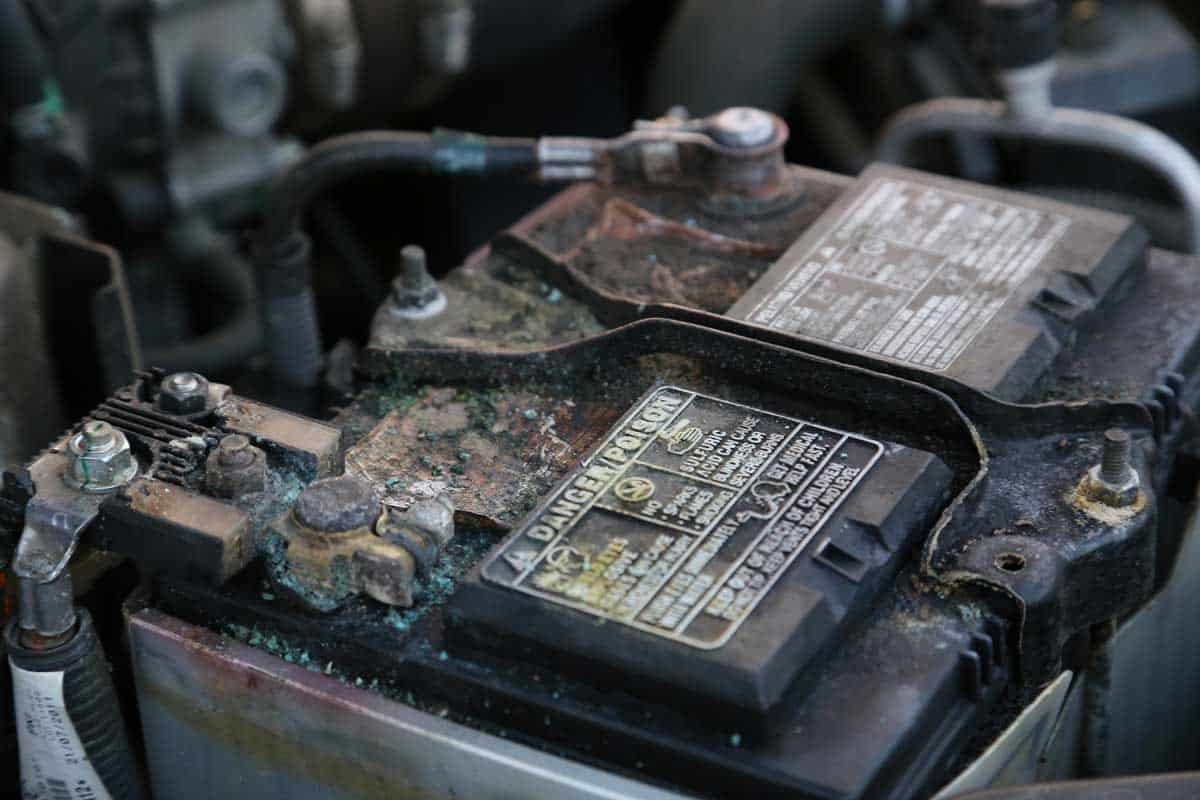Last Updated on March 27, 2023 by Ryan
If a car battery is leaking acid, it likely means that the battery has reached the end of its life and needs to be replaced. If you try to start the car with a leaking battery, it could cause major damage due to corrosion. Symptoms of a leaking battery can include white or greenish residue on the terminals, a rotten egg smell near the engine bay, or bubbles coming from under the hood.
It is also possible for batteries to leak without any visible signs of leakage if they are overcharged. The best way to prevent your car from not starting due to an old and damaged battery is by replacing it as soon as possible with one that meets manufacturer specifications.
If you find that your car won’t start and you suspect a leaking battery, it’s important to take immediate action. A car battery leaking acid is not only dangerous for the environment but can also cause permanent damage to your vehicle if left unchecked. It’s best to seek professional help from an auto shop as soon as possible in order to protect both your health and your car from further harm.
Why is my car battery leaking?
New Car Battery Leaking Fluid
If you find that your new car battery is leaking fluid, don’t panic! This is usually a sign of overcharging or an electrolyte imbalance in the cells. If you notice any leakage from the battery, it’s important to take care of it immediately.
You can do this by checking the charge level of a multi-meter and adding distilled water if necessary to restore balance. Additionally, it may be time for a new battery if the leakage persists after correcting these issues.
Leaking Car Battery Symptoms
Leaking car battery symptoms can be subtle, but they are important to recognize so that you can take action before damage occurs. Common signs of a leaking battery include corrosion around the terminals, fluid on top of the battery case, and an overall decrease in performance. If left untreated for too long, the entire electrical system can be damaged and cause your car to not start or run properly.
It is always best to have your vehicle inspected by a professional mechanic if you suspect any problems with your car’s battery.
How to Fix a Leaking Car Battery
If you have a leaking car battery, the best way to repair it is to replace it with a new one. Before replacing your car battery, ensure that all the cables are disconnected and that no other components are damaged. Once you’ve replaced the battery, make sure it’s securely connected and all electrical connections are sealed tightly with grease or petroleum jelly.
Additionally, check for any corrosion around the terminals of your car’s battery and clean them off if necessary. Finally, keep an eye on your car’s charging system as well as its power levels to ensure everything is in working order.
Car Battery Leaking from Caps
Car batteries are designed to be sealed, so it is important to pay attention if the caps on your car battery start leaking. Leaking from the caps can indicate that there is an issue with the water levels in the battery. The leaking liquid could be a combination of sulfuric acid and water, which indicates that you need to replace your battery as soon as possible.
If the leak is left unchecked for too long, it may damage other parts of your vehicle or even cause electric shocks. It’s important to take action right away if you notice any leakage coming from your car’s battery caps!

Credit: vehq.com
Can a Leaking Battery Cause a Car Not to Start?
Yes, a leaking battery can cause a car not to start. Leaking batteries will typically leak out the electrolyte solution that is stored inside the battery, which then causes corrosion on the terminals and wiring of the vehicle’s electrical system. This corroded wiring can severely reduce or completely block off power from reaching vital components like spark plugs and fuel injectors, causing your car to not start properly.
If you notice any kind of fluid leaking from your battery it should be replaced immediately in order to avoid further damage to your vehicle’s electrical system.
Can Battery Corrosion Cause No Start?
Yes, battery corrosion can cause a no start issue. Corrosion is an accumulation of oxidized material on the terminals and connectors that connect the battery to the starter motor, alternator or other electrical components. When enough corrosion builds up it can prevent power from reaching these parts and result in a no start condition.
It’s important to regularly inspect your battery for signs of corrosion such as white powdery residue on the terminals or discolored connectors. If you find any signs of corrosion, clean it off using baking soda and water or some other type of cleaning product specifically designed for this purpose before attempting to restart your vehicle.
Can You Jump a Car With Leaking Battery Acid?
No, it is not recommended to jump a car with leaking battery acid. Battery acid is highly corrosive and can cause serious damage to your vehicle’s electrical system if it comes into contact with any of its components during the jump start process. Additionally, jumping a car with leaking battery acid could potentially cause an explosion or fire due to the chemical reaction between the battery acid and other elements in the engine bay.
Therefore, it is important to have any leaks that may be present sealed up before attempting to jump start your vehicle.
What to Do If Car Battery is Leaking Acid?
If your car battery is leaking acid, it’s important to act quickly and take the necessary safety precautions. First, switch off the engine and disconnect any cables connected to the battery. Wear protective gear such as gloves and goggles when handling acidic liquids as they can cause skin irritation or burns if not handled properly.
If you’re able to safely move the battery away from other components of your vehicle, do so in order to minimize any potential damage from seepage or corrosion. Avoid using a vacuum cleaner on wet surfaces as this could potentially create sparks that may ignite spilled acid. The most effective way of cleaning up leaked acid is by using baking soda mixed with water – pour it onto affected areas before wiping clean with cloths or paper towels for disposal in an appropriate container according to local regulations.
Finally, if needed, contact a professional mechanic who will be able to provide further advice on how best to repair or replace your car battery.
Conclusion
In conclusion, a leaking car battery can cause serious issues if not addressed immediately. Not only can it lead to corrosion in the engine compartment and electrical components, but it can also prevent the vehicle from starting due to lack of power. It is important to replace your battery with one that is designed for your make and model, as well as inspect all other parts related to the charging system.
If you are still having trouble getting your car started after replacing or repairing the battery, seek professional assistance from an experienced auto technician.



